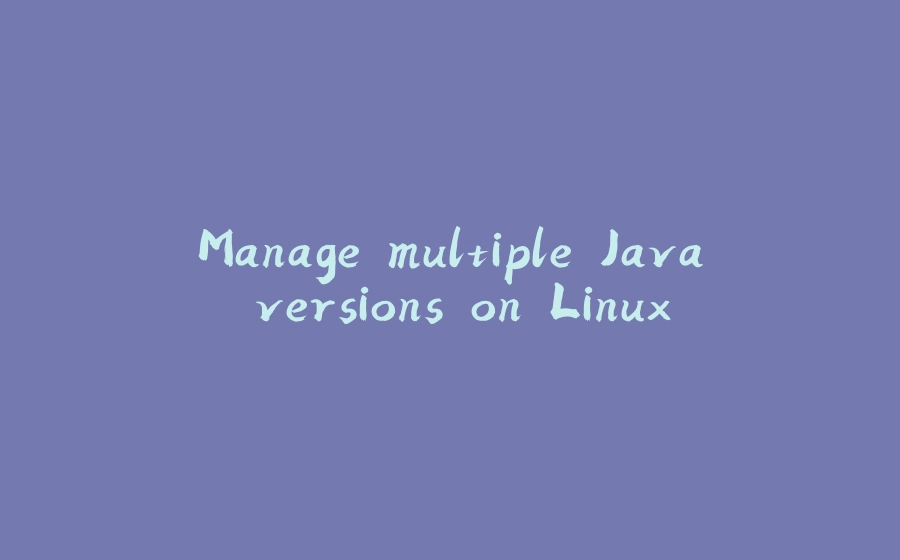1. Introduction
In 2017 Oracle announced Java’s (then new) six months release cadence. This was a significant change from Java’s previous cycle of one large release every two to three years. With more releases, Java is providing developers with more innovations and making the platform even more attractive. This also means that it is more complicated to manage the different versions if you want to keep up with the new features or if your different projects require different versions. In this blog post, we’ll see how to manage multiple Java versions on Linux using jEnv.
2. What is jEnv ?
jEnv is a command line tool that helps to manage several Java installations. This way developers can hopefully forget how to set the JAVA_HOME environment variable. With jEnv you can setup local Java installations on global, directory and even shell level. This is possible because jEnv stores the local Java version in a .java-version file and depending on the context, will simply direct to the corresponding installation file.
3. Installation
We will start by installing some JDK versions so that we have versions to manage. We will also need Git to be able to install jEnv.
Install Java SE 8 and Java SE 11
$ sudo apt install openjdk-8-jdk && sudo apt install openjdk-11-jdk
Install Git
$ sudo apt install git
To install jEnv we start by cloning its git repository
$ git clone https://github.com/gcuisinier/jenv.git ~/.jenv
Next we add it to our Bash Shell
$ echo 'export PATH="$HOME/.jenv/bin:$PATH"' >> ~/.bash_profile
$ echo 'eval "$(jenv init -)"' >> ~/.bash_profile
$ source .bash_profile
If the above commands do not work for you don’t worry, just use .bashrc instead
$ echo 'export PATH="$HOME/.jenv/bin:$PATH"' >> ~/.bashrc
$ echo 'eval "$(jenv init -)"' >> ~/.bashrc
$ source .bashrc
The first command above adds jEnv to your PATH so that its binaries can be found. The second simply initializes jEnv once your shell loads and source is a bash shell built-in command that executes the content of the file.
4. Usage
If you run jenv you should get the following
$ jenv
jenv 0.5.2-28-g3f3e517 Usage: jenv <command> [<args>]
Some useful jenv commands are: commands List all available jenv commands local Set or show the local application-specific Java version global Set or show the global Java version shell Set or show the shell-specific Java version rehash Rehash jenv shims (run this after installing executables) version Show the current Java version and its origin versions List all Java versions available to jenv which Display the full path to an executable whence List all Java versions that contain the given executable add Add JDK into jenv. A alias name will be generated by parsing "java -version" See `jenv help <command>' for information on a specific command. For full documentation, see: https://github.com/jenv/jenv/blob/master/README.md Now let’s add the different JDK versions we installed to our command line tool
$ jenv add /usr/lib/jvm/java-1.8.0-openjdk-amd64
$ jenv add /usr/lib/jvm/java-11-openjdk-amd64
To see which versions our tool can manage, execute
$ jenv versions
system 11 11.0 11.0.4 *1.8 (set by /home/nkengasong/.jenv/version) 1.8.0.222 openjdk64-11.0.4 openjdk64-1.8.0.222 Hopefully you can see something similar too. Also notice the different 11s and 1.8.0s, they are just aliases referring to the same version – so you actually have two versions being managed.
Now you can specify which version you want to use. For example, if you want to use Java 11 globally use the following command
$ jenv global 11
You can work on a JDK 8 project, without changing your global version.
$ mkdir my-jdk-8-project
$ cd my-jdk-8-project
$ jenv local 1.8
If you check the Java version in your my-jdk-8-project directory you will obtain the following
$ java -version
openjdk version "1.8.0_222" OpenJDK Runtime Environment (build 1.8.0_222-8u222-b10-1ubuntu1~18.04.1-b10) OpenJDK 64-Bit Server VM (build 25.222-b10, mixed mode) Finally we have to set the $JAVA_HOME because jEnv won’t do that for us unfortunately. This is very important given that several tools like IDEs depend on this variable. To do so, we enable the export plugin as follows
$ jenv enable-plugin export
We can now verify that the $JAVA_HOME variable is set to the global Java version
$ echo $JAVA_HOME
/home/nkengasong/.jenv/versions/1.8 You can also enable other plugins like the maven and gradle plugins
$ jenv enable-plugin maven
$ jenv enable-plugin gradle
5. Conclusion
In this blog post, we saw how to manage multiple Java versions on Linux using jEnv – a command line tool to help you forget how to set the JAVA_HOME environment variable.























暂无评论内容